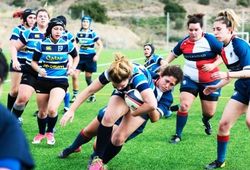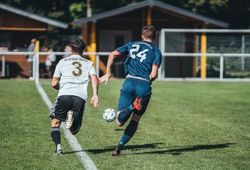If you would like more information about Soccer Scholarships to the USA, then register for an assessment with FirstPoint USA today!
Rest and Recovery: Guest Post by Ashleigh Townsend
6 min read
Ashleigh Townsend is an former FirstPoint USA client, who secured a soccer scholarship in 2003 to the University of the Cumberlands. Since college, Ashleigh has had great success, playing professionally in the U.S for Cincinnati Kings, Wilmington Hammerheads and Real Maryland Monarchs. Ashleigh also runs a successful fitness blog, definitely worth a read for anyone interested in healthy living and upping their fitness levels!
Given Ashleigh’s athletic experience, we thought it would be great to get his advice on all things fitness. In his third monthly guest blog post, Ashleigh covers recommended rest and recovery for athletes…
Rest and Recovery
Rest and recovery are vital aspects to any athletes lifestyle and play a big part in sports performance, brain function and attitude. If insuf?cient rest, recovery and sleep is not part of your life now you could be seriously hampering yourself and your ability to be truly the best.
Rest and recovery need start as soon as you have ?nished a training session or match with a thorough cool down. The reason behind this is that throughout training and match situations you are putting your body through a form of fatigue and often times pushing your cardiovascular system to the limits. As trained athletes I am sure you can handle the daily tasks of training but the test of top level athletes is being able to repeat performance day after day and week after week. So looking after your body is key and this as I have said needs to start as soon as possible after exercise. This is known as active recovery.
After this initial stage of recovery we must re-fuel our bodies with the correct foods and ?uids that will help our bodies grow and replenish the energy burnt throughout exercise and training.
That takes care of the recovery aspect now what do we mean by rest?
Often rest is one part of a training plan/schedule that is overlooked and neglected. But it is in fact as important as everything else if not more so. You have to allow for proper rest and allow the body to repair itself in order to train hard and with quality everyday. So weekly schedules must include some rest days. Days that do not involve intense training. Training at a high intensity all the time with no rest days will lead to over training and that can have serious effects for athletes. None of which I would wish on anyone. Here are a few signs that over training might be taking place:
• Washed out
• Drained
• Tired
• Lacking energy
• Lacking motivation
The best form of rest however is sleep which I will cover in my next
post. With all this in mind let me give you an incite into how I incorporate
REST & RECOVERY into my training schedule. Training for me is something I really enjoy and look forward to each day, it gives me a challenge and often times pushes me to my limits but at the end of the day I ?nd it fun so it never feels like work. At the same time though I know without my rest days and recovery days I am not able to keep the high standards I set myself. Recovery days for me often involve getting in the pool and doing some none weight bearing movements. Other tools I utilize include the foam roller, a tennis ball and my favourite my jump stretch band.
Rest days however are what they say they are. A day to rest, but I am not someone who can sit down on the couch all day so a rest day might involve a gentle walk, but de?nitely NO training. Usually I will go 4 days of training then take a rest day and then if training is particularly hard and intense for a longer period of time I will throw in a recovery day as well to break the training load up. This is something that is very individual and one to play with and ?nd what works best for you, only you truly know how your body functions best.
We all need SLEEP
Why it's important?
• Enhance problem solving skills in the brain (key for us all as students)
• Boost our athletic performance (key for us as athletes)
• Make you feel better (make you smile)
• Help you with overall daily energy so you don't have to rely on ENERGY DRINKS and
sugar loaded foods.
• Helps with some immune function, keeping away that dreaded cold and ?u.
So there we have 5 key points as to why sleep is important but how much do YOU NEED? Again like most of the articles I will write there is no right an wrong answer here really. It again is down to personal lifestyle and your own choices. Experts say that between 8-10 hours is what the majority of people need. I personally need 8 1/4 hours to feel fully rested and ready to take on the tasks my day has install for me. ( My usual routine is 10 pm bed 6:15am wake up) One thing I will say to you all though is that as athletes you are probably going to need more than you think just because of the training load I am sure most of you have on top of everything else (work/school) in your daily lives.
Things to bear in mind about sleep
• Do sleep in a dark room (blackout blinds if you can get them)
• Do sleep in a cool room (18-20 degrees)
• Do get plenty of exercise throughout your day.
• Do have a routine (set yourself a bedtime for the majority of the time and a time to wake
up naturally)
• Don't take iPhones, iPads etc. or laptops to bed with you.
• Don't have bright lights shining from TVs, phone chargers etc.
• Don't have loud noises distracting you.
• Don't have caffeine before bed
Try to not us an alarm clock. If you get into a routine your body will just wake up at the time it knows to. Shocking yourself with a loud noise ?rst thing in the morning is a great way to wake up in a bad mood. Sleep well and wake up well rested and take on your day in your best possible condition.
TRAIN HARD. EAT RIGHT. LIVE WELL.




